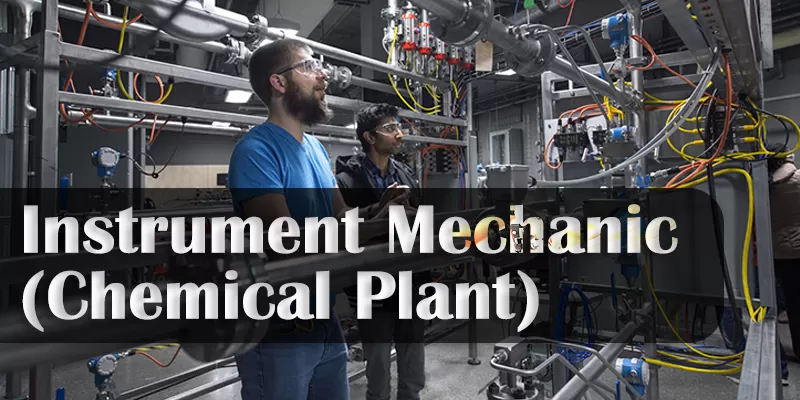
Instrument Mechanic (Chemical Plant) Trade – Detailed Course Outline
The Instrument Mechanic (Chemical Plant) trade under NCVT is a highly skilled and job-oriented vocational course aimed at providing in-depth training for individuals seeking careers in both government and private sectors, as well as empowering them to pursue self-employment. This trade is meticulously designed to meet the modern industrial requirements of Indian industries and global markets, especially in the chemical and processing sectors.
Over the two-year duration of the course, candidates undergo intensive hands-on training in professional skills, professional knowledge, engineering drawing, workshop calculation and science, and employability skills. Additionally, candidates are encouraged to undertake project work and participate in extracurricular activities to build confidence, creativity, and leadership qualities.
Course Structure and Training Coverage
First Year Training Overview:
In the first year, the focus is on building a solid foundation in safety, environment, and core trade skills. The training modules are structured as follows:
- Safety and Environmental Practices:
- Introduction to industrial safety and environmental policies.
- Proper usage of Personal Protective Equipment (PPE).
- Handling fire-fighting equipment like different types of fire extinguishers.
- Practicing artificial respiratory resuscitation and first aid.
- Familiarization with Tools and Equipment:
- Introduction to trade-specific tools, their maintenance, and standardization.
- Hands-on practice in engineering workshops, including chemistry and physics laboratories.
- Basic Laboratory Practices:
- Performing titrations, separations, and preparing standard solutions.
- Measuring pH, conductivity, and analyzing chemical substances.
- Understanding the physical properties of materials through practical experiments.
- Basic Fitting and Mechanical Skills:
- Execution of fitting jobs using filing, marking, and measuring tools.
- Drilling, reaming, counterboring, countersinking, riveting, seaming, and thread cutting.
- Exposure to basic gas welding and arc welding techniques.
- Electrical and Electronics Training:
- Identification and testing of electrical and electronic components.
- Calibration and testing of electrical measuring instruments such as ammeters, voltmeters, and wattmeters.
- Soldering and de-soldering of various electrical/electronic components on through-hole PCBs.
- Construction and testing of rectifier circuits, regulated power supplies, and electronic circuits.
- Computer Fundamentals and Hardware Skills:
- Basic computer hardware assembly and disassembly.
- Connecting and configuring cables and components.
- Understanding desktop hardware components, replacing faulty parts, and reinstalling systems.
Second Year Training Overview:
In the second year, trainees advance to specialized field instruments and process control systems used in chemical plants.
- Field Instruments and Calibration:
- Identification, selection, and application of field instruments based on industrial requirements.
- Troubleshooting, calibrating, testing, and repairing pressure measuring and control instruments.
- Planning, erecting, and commissioning field control loop systems for pressure processes.
- Temperature, Flow, and Level Instruments:
- Calibration and troubleshooting of temperature measurement instruments including thermocouples, RTDs, and pyrometers.
- Repairing and calibrating flow measuring devices such as turbine meters, D.P. transmitters, and positive displacement meters.
- Working on level measurement systems, calibration of level transmitters, and performing maintenance activities.
- Electronic/Pneumatic Instrumentation:
- Calibration and repair of electronic/pneumatic converters, safety valves, and recorders for different process parameters.
- Calibration and maintenance of transmitters for pressure, temperature, level, and flow measurements.
- Controllers and Automation:
- Selection, process control, and troubleshooting of controllers used in chemical plants.
- Erection, commissioning, overhauling, and repair of final control elements such as control valves with actuators and accessories.
- Exposure to PLC (Programmable Logic Controller), SCADA (Supervisory Control and Data Acquisition), and DCS (Distributed Control System).
- Practical sessions on PID controllers, cascade control, ratio control, and feed-forward control systems.
- Process Plant Operation and Maintenance:
- Operating distillation columns, triple effect evaporators, heat exchangers, and chillers.
- Planning and executing automatic process control block diagrams and integrating fieldbus control systems.
Job Roles Upon Course Completion:
Graduates of the Instrument Mechanic (Chemical Plant) trade are equipped to take on a variety of skilled job roles in industrial plants and process industries.
1. Mechanic Precision Instrument (General):
- Testing, repairing, and overhauling precision instruments used for mechanical, electrical, hydraulic, pneumatic, optical, or orthopedic applications.
- Dismantling and cleaning components, replacing damaged parts, reassembling instruments, and performing final testing to ensure efficiency.
2. Technician Instrumentation:
- Troubleshooting and calibrating field instruments.
- Replacing faulty peripheral components, preparing service reports, and documenting repairs.
- Using advanced diagnostic equipment for precise calibration and testing.
3. Mechanic Precision Instrument (Mechanical):
- Manufacturing, altering, and adjusting mechanical instruments.
- Operating precision equipment like lathes, milling machines, and grinding machines.
- Repairing meters, gauges, balances, and theodolites.
4. Mechanic Precision Instrument (Electrical):
- Repairing and setting electrical parts in precision instruments such as meggers, voltmeters, ammeters, and galvanometers.
- Inspecting and replacing faulty electrical components, ensuring accurate readings, and testing performance as per standards.
5. Reservoir Caretaker:
- Regulating water flow and maintaining water levels in reservoirs.
- Monitoring gauges, performing minor repairs, and ensuring the smooth operation of reservoir equipment.
6. Wastewater Treatment Plant Operator:
- Operating sewage treatment plants and related equipment.
- Controlling the processing of sewage, maintaining logs, and performing laboratory tests on samples.
- Coordinating with maintenance teams and ensuring compliance with environmental standards.
7. Chemical Processing Plant Controllers:
- Operating and monitoring chemical processing plants.
- Adjusting processing units for distillation, filtration, heating, and refining chemicals.
- Performing quality checks, maintaining production logs, and ensuring optimal plant operation.
8. Continuous Still Operator (Petroleum):
- Managing distillation units for refining petroleum products.
- Adjusting equipment to maintain process variables like temperature, pressure, and flow rate.
- Ensuring product quality and quantity by monitoring and testing throughout the process.
Conclusion:
The Instrument Mechanic (Chemical Plant) trade offers a comprehensive curriculum that blends theoretical knowledge with intensive practical training, enabling candidates to excel in the field of instrumentation and process control. This program prepares individuals for rewarding careers in industries such as petrochemical, fertilizer, cement, power generation, wastewater treatment, and more. By mastering advanced instrumentation, automation, and process control technologies, graduates become valuable assets to modern industrial operations.
